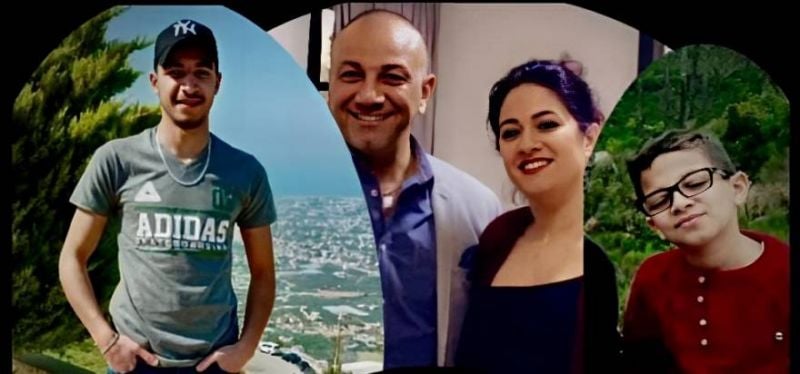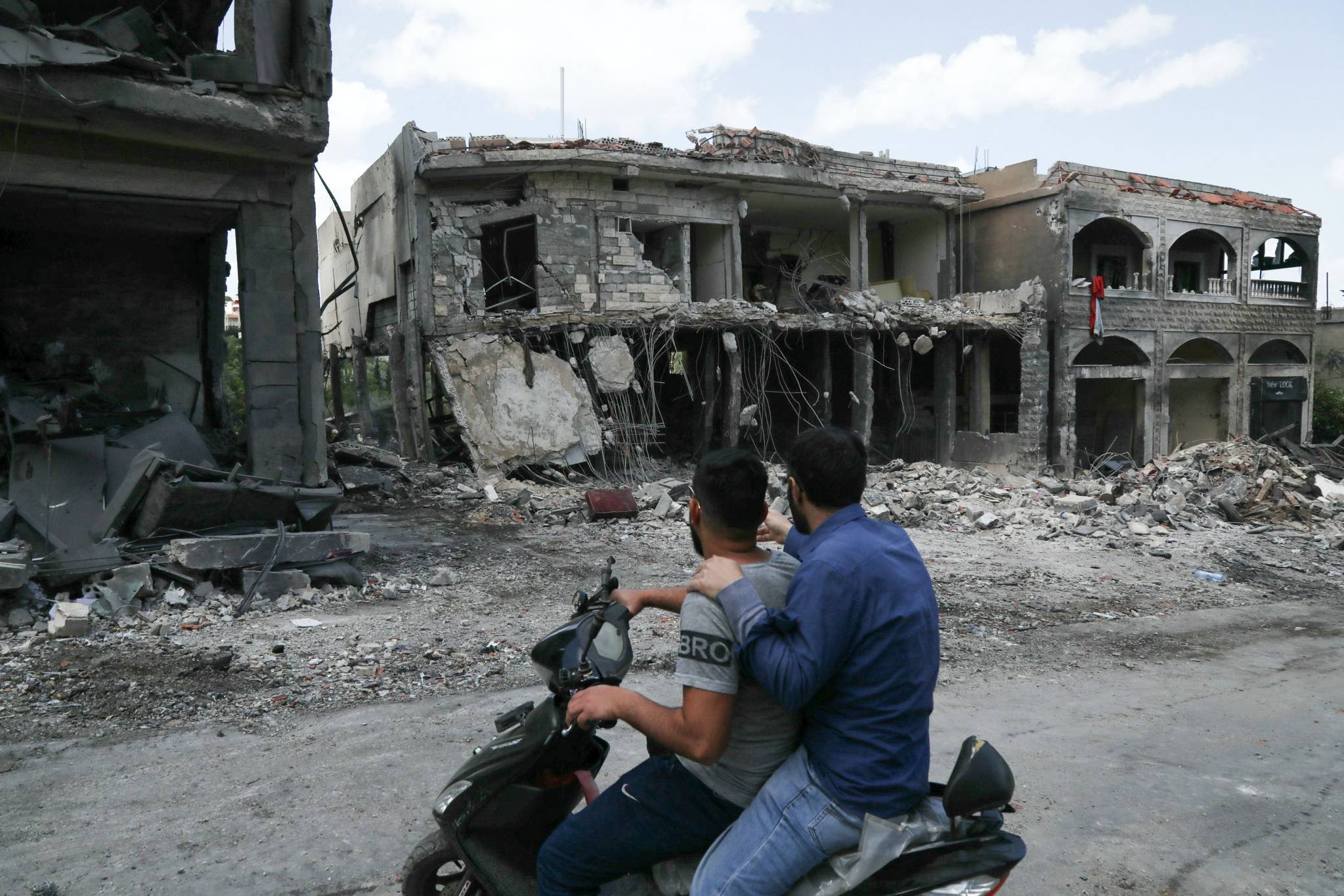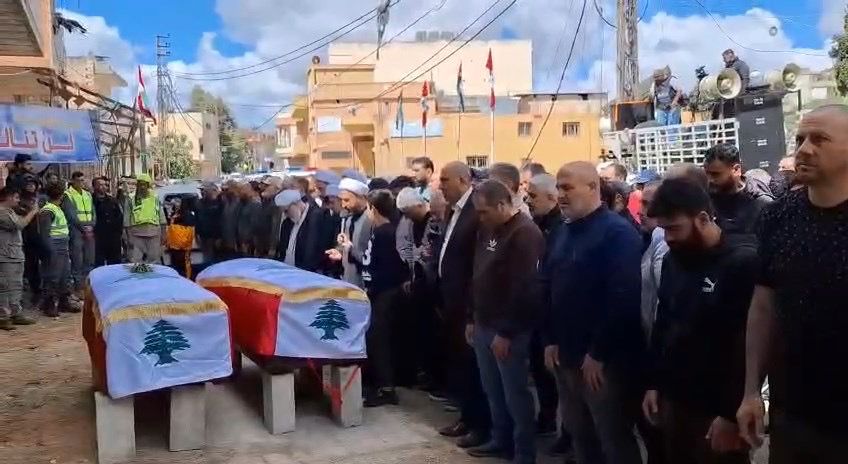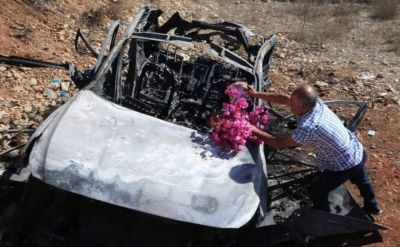
Fadi Hnayki, May Ammar, and the siblings Mohammad and Ahmad Hnayki, killed in Mais al-Jabal on May 5, 2024. (Credit: NNA)
BEIRUT — The family of six had been displaced to Beirut alongside nearly 90,000 other people pushed away by bombs since Oct. 8.
Fadi Hnayki, his wife Maya Ammar and two sons thought they would quickly visit their hometown of Mais al-Jabal in the Marjayoun district, a village that has been repeatedly struck by Israel.
They would attend the funeral of a relative who had died in the US, as well as check on their home and supermarket. The couple left behind their two young daughters in Beirut.
But the Israeli strike came before they could finish their plans.
 wo men on mopeds pass buildings destroyed by an Israeli strike in Mais al-Jabal, South Lebanon, May 5, 2024. (Credit: AFP)
wo men on mopeds pass buildings destroyed by an Israeli strike in Mais al-Jabal, South Lebanon, May 5, 2024. (Credit: AFP)
Fadi, Maya, Mohammad, aged 21 from Ammar’s first marriage, and the couple’s son, Ahmad, aged 12, all were killed on Sunday as they visited Fadi’s supermarket, village mukhtar Mohammad Choukair told L’Orient Today.
“They had been residents of the village but when the war started, and people started leaving, the family packed some of their belongings and left,” Choukair added.
‘I cried like a baby’
When rescue workers arrived to the scene on Sunday morning after the strike, locals told them that the family consisted of six members, according to residents. But after rescuers found only four bodies, a relative of the family was told that the girls had stayed behind in Beirut, and had narrowly escaped death.
“I cried like a baby on Sunday afternoon after retrieving the body of the 12-year-old boy from his childhood home,” a Civil Defense volunteer who was a part of the rescue team told L’Orient Today on condition of anonymity.
Like the family killed on Sunday, many people have gone back to their home villages in the south in recent months to take their belongings, after leaving home with few winter items, residents say. They didn’t think that the conflict would stretch on for more than half a year.
“Months have passed, and seasons changed. I left with winter clothes and went back to my village to get my summer clothes as the days grew warmer. I never thought when I packed my small backpack months ago to leave allegedly temporarily to Beirut to stay with my grandma that I wouldn’t be going back home anytime soon,” Duniah Moallem, a high school teacher, from Mais al-Jabal told L’Orient Today.
‘Their only fault was that they were unarmed civilians on their own land’
Mukhtar Hassan Kabalan, who lives near the victims' house in Mais al-Jabal and is a relative of the slain mother, Maya Ammar, told L’Orient Today that the family had been hardworking and respected.
“Maya is from the village but her husband is not. Her husband Fadi had opened a supermarket in the town around a year and a half ago and was a good hardworking man, respected by locals. He was also a distributor for a soap and detergent company in the south,” Kabalan said.
 Debris are scattered around buildings damaged by anf Israeli strike in the southern Lebanese border village of Mais al-Jabal on May 5. (Credit: AFP)
Debris are scattered around buildings damaged by anf Israeli strike in the southern Lebanese border village of Mais al-Jabal on May 5. (Credit: AFP)
“They were the best of neighbors," Kabalan said.
“We condemn this criminal act. Four of our innocent townspeople were killed. They were unarmed, their only fault was that they were in their own land, but as the owners of the land we insist on remaining here and we insist that the only way with this enemy [Israel] is through the resistance,” Kabalan added.
Hezbollah MP condemns attack
Maya and her son Mohammad were buried close to each other in Mais al-Jabal while Fadi and Ahmad were buried together in Beirut’s Bauchourieh area, according to Kabalan.
Hezbollah MP Ali Fayyad attended Maya and Mohammad’s funeral on Monday in the southern village, stating there that "the Israeli enemy knows well that the targets were civilians, and this is an undeniable, clear-cut crime...therefore the resistance has the right to respond to any crime against Lebanese civilians."
He said that Hezbollah and its allied fighters “target military objectives [in Israel] while the [Israeli] enemy targets civilians, villages, homes, shops and populated areas."
Following the killing of the family, Hezbollah launched dozens of rockets into northern Israel on Sunday as a response "to the massacre targeting innocent civilians committed by Israel in Mais al-Jabal," the party said in a statement.
 Funeral ceremony for Maya Ammar and her son Mohammed on May 6, 2024 in Mais al-Jabal. (Courtesy of Muntasser Abdallah/L'Orient Today)
Funeral ceremony for Maya Ammar and her son Mohammed on May 6, 2024 in Mais al-Jabal. (Courtesy of Muntasser Abdallah/L'Orient Today)
Since Oct. 8, Hezbollah and Israel have been involved in almost daily cross border fire.
The fighting has killed 382 people in Lebanon since then, according to L’Orient Today’s count. On the Israeli side, 11 soldiers and nine civilians were killed, according to an official report quoted by AFP.
However, Hezbollah has repeatedly said that Israel is not announcing the accurate number of its casualties.
This isn’t the first incident where civilians who had fled the south and temporarily gone back to pick up their belongings or check on their estates have been killed by an Israeli strike.
In November three young girls, the eldest being 14, were killed when an Israeli strike targeted their vehicle on the road between Aitaroun and Ain Ibl while they were retrieving their belongings from their hometown of Ainata in the Bint Jbeil district.
